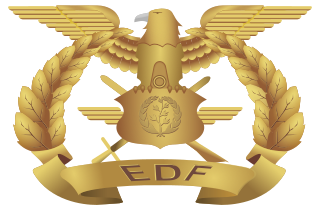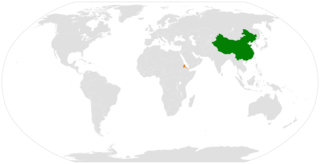| |||||
| Decades: | |||||
|---|---|---|---|---|---|
| See also: | Other events of 1996 Timeline of Eritrean history | ||||
Events in the year 1996 in Eritrea .
| |||||
| Decades: | |||||
|---|---|---|---|---|---|
| See also: | Other events of 1996 Timeline of Eritrean history | ||||
Events in the year 1996 in Eritrea .
Telecommunications in Eritrea are under the authority of the Government of Eritrea.

The Eritrean Defence Forces (EDF) are the combined military forces of Eritrea composed of three branches: Eritrean Army, Eritrean Air Force and Eritrean Navy. The Army is by far the largest, followed by the Air Force and Navy. The Commander-in-Chief of the EDF is the President of Eritrea. Their military role stems from Eritrea's strategic geographical location, located on the Red Sea with a foothold on the Bab-el-Mandeb strait.

The foreign relations of Eritrea are the policies of the Eritrean government by which it administers its external relations with other nations. Since its independence, Eritrea's foreign relations have been dominated by conflict and confrontation, both in the regional and international arenas. It has maintained often troubled, and usually violent, relations with its neighbors, including brief armed conflicts with Yemen and Djibouti and a destructive war with its bigger-neighbour, Ethiopia. At present, Eritrea has very tense relations with neighboring Ethiopia and Djibouti. Relations in the international arena also have been strained since the last decade, particularly with major powers. What appeared cordial relations with the US in the 1990s turned acrimonious following the border war with Ethiopia, 1998-2000. Although the two nations have a close working relationship regarding the ongoing war on terror, there has been a growing tension in other areas. Ties with international organizations such as the United Nations, the African Union, and the European Union have also been complicated in part because of Eritrea's outrage at their reluctance to force Ethiopia to accept a boundary commission ruling issued in 2002.

The ITU Telecommunication Standardization Sector (ITU-T) is one of the three sectors of the International Telecommunication Union (ITU). It is responsible for coordinating standards for telecommunications and Information Communication Technology such as X.509 for cybersecurity, Y.3172 and Y.3173 for machine learning, and H.264/MPEG-4 AVC for video compression, between its Member States, Private Sector Members, and Academia Members.

Asmara, or Asmera, is the capital and most populous city of Eritrea, in the country's Central Region. It sits at an elevation of 2,325 metres (7,628 ft), making it the sixth highest capital in the world by altitude and the second highest capital in Africa. The city is located at the tip of an escarpment that is both the northwestern edge of the Eritrean Highlands and the Great Rift Valley in neighbouring Ethiopia. In 2017, the city was declared as a UNESCO World Heritage Site for its well-preserved modernist architecture. The site of Asmera was first settled in 800 BC with a population ranging from 100 to 1,000. The city was then founded in the 12th century AD after four separate villages unified to live together peacefully after long periods of conflict. Under Italian rule the city of Asmara was made capital of Eritrea in the last years of the 19th century.

The Horn of Africa (HoA), also known as the Somali Peninsula, is a large peninsula and geopolitical region in East Africa. Located on the easternmost part of the African mainland, it is the fourth largest peninsula in the world. It is composed of Ethiopia, Eritrea, Somalia and Djibouti; broader definitions also include parts or all of Kenya, Sudan, South Sudan, and Uganda. The term Greater Horn Region (GHR) can additionally include Burundi, Rwanda, and Tanzania. It lies along the southern boundary of the Red Sea and extends hundreds of kilometres into the Guardafui Channel, Gulf of Aden, and Indian Ocean and shares a maritime border with the Arabian Peninsula of Western Asia.

The Eritrean War of Independence was a war for independence which Eritrean independence fighters waged against successive Ethiopian governments from 1 September 1961 to 24 May 1991.
Eritrea faces a wide variety of issues. Environmental issues include continued deforestation, desertification, soil erosion, overgrazing, and significant land loss as a result of the presence of hundreds of thousands of land mines. Additionally, there is heavy mining within the country for gold, copper, and zinc. For years, mining was the only major source of revenue for the country and so this was encouraged by the national government.

The Eritrean Cabinet of Ministers is headed by the President of Eritrea, Isaias Afwerki.

The Eritrean Telecommunication Services Corporation, more commonly known as EriTel, is the sole operator of landline telephone communication infrastructure in Eritrea. It is also the sole operator of the mobile telephone service. However, it is but one of several internet service providers in the country.
The ICT Development Index (IDI) is an index published by the United Nations International Telecommunication Union based on internationally agreed information and communication technologies (ICT) indicators. This makes it a valuable tool for benchmarking the most important indicators for measuring the information society. The IDI is a standard tool that governments, operators, development agencies, researchers and others can use to measure the digital divide and compare ICT performance within and across countries. The ICT Development Index is based on 11 ICT indicators, grouped in three clusters: access, use and skills.

The Ethiopian Empire, also formerly known by the exonym Abyssinia, or just simply known as Ethiopia, was an empire that historically spanned the geographical area of present-day Ethiopia and Eritrea from the establishment of the Solomonic dynasty by Yekuno Amlak approximately in 1270 until the 1974 coup d'etat of Emperor Haile Selassie by the Derg. By 1896, the Empire incorporated other regions such as Hararghe, Gurage and Wolayita, and saw its largest expansion with the federation of Eritrea in 1952. Throughout much of its existence, it was surrounded by hostile forces in the African Horn; however, it managed to develop and preserve a kingdom based on its ancient form of Christianity.

Eritrea, officially the State of Eritrea, is a country in the Horn of Africa region of Eastern Africa, with its capital and largest city at Asmara. It is bordered by Ethiopia in the south, Sudan in the west, and Djibouti in the southeast. The northeastern and eastern parts of Eritrea have an extensive coastline along the Red Sea. The nation has a total area of approximately 117,600 km2 (45,406 sq mi), and includes the Dahlak Archipelago and several of the Hanish Islands.

Finland-Ethiopia relations are foreign relations between the Finland and Ethiopia. Both countries established diplomatic relations on July 17, 1959. Ethiopia is represented in Finland through its embassy in Stockholm, Sweden. Finland has an embassy in Addis Ababa.
The following are international rankings of Ethiopia.
These are the international rankings of Cyprus

China–Eritrea relations refers to the current and historical relationship between China and Eritrea. Eritrea gained independence from Ethiopia in 1993 and, as of 2007, relations between the two states registered "smooth growth".

Telecommunication is the transmission of information by various types of technologies over wire, radio, optical, or other electromagnetic systems. It has its origin in the desire of humans for communication over a distance greater than that feasible with the human voice, but with a similar scale of expediency; thus, slow systems are excluded from the field.
Global Internet Usage is the number of people who use the Internet worldwide.